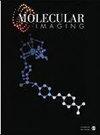用scFv-IRDye800CW和Cetuximab-IRDy800CW对小鼠异种移植模型中EGFR过表达肿瘤的近红外荧光成像
IF 2.4
4区 医学
Q2 Medicine
引用次数: 3
摘要
EGFR(表皮生长因子受体)在多种人类癌症(包括头颈部鳞状细胞癌、结肠癌和一些乳腺癌)中过表达,因此被认为是癌症治疗或影像学目的的理想靶点。在目前的研究中,我们制作了一种基于egfr的近红外探针(称为et. hum . scfv - irdye - 800cw),并在小鼠模型中评估了其对egfr过表达肿瘤的识别和成像能力。如分子探针由其亲本抗体(西妥昔单抗,fda批准的单克隆抗体)和IRD800CW等组成。scFv-IRDye-800CW能够识别egfr过表达的小鼠肿瘤。cet.Hum。scFv-IRDye-800CW在小鼠肿瘤成像方面优于西妥昔单抗探针。肿瘤与背景比和血液清除率均高于对照组。scFv-IRDye-800CW作为成像探头。本文章由计算机程序翻译,如有差异,请以英文原文为准。
Near-Infrared Fluorescence Imaging of EGFR-Overexpressing Tumors in the Mouse Xenograft Model Using scFv-IRDye800CW and Cetuximab-IRDye800CW
EGFR (epidermal growth factor receptor) is overexpressed in a variety of human cancers (including squamous cell carcinoma of head and neck, colon cancer, and some breast cancers) and therefore is regarded as an ideal target for cancer therapy or imaging purposes. In the current study, we produced a scFv-based near-infrared probe (called cet.Hum.scFv-IRDye-800CW) and evaluated its ability in recognizing and imaging of EGFR-overexpressing tumors in a mouse model. Like the molecular probe consisting of its parental antibody (cetuximab, an FDA-approved monoclonal antibody) and IRD800CW, cet.Hum.scFv-IRDye-800CW was able to recognize EGFR-overexpressing tumors in mice. cet.Hum.scFv-IRDye-800CW was found to be superior to the cetuximab-based probe in imaging of mouse tumors. The tumor-to-background ratio and blood clearance rate were higher when cet.Hum.scFv-IRDye-800CW was used as an imaging probe.
求助全文
通过发布文献求助,成功后即可免费获取论文全文。
去求助
来源期刊

Molecular Imaging
生物-核医学
CiteScore
4.50
自引率
3.60%
发文量
21
审稿时长
>12 weeks
期刊介绍:
Molecular Imaging is a peer-reviewed, open access journal highlighting the breadth of molecular imaging research from basic science to preclinical studies to human applications. This serves both the scientific and clinical communities by disseminating novel results and concepts relevant to the biological study of normal and disease processes in both basic and translational studies ranging from mice to humans.
 求助内容:
求助内容: 应助结果提醒方式:
应助结果提醒方式:


